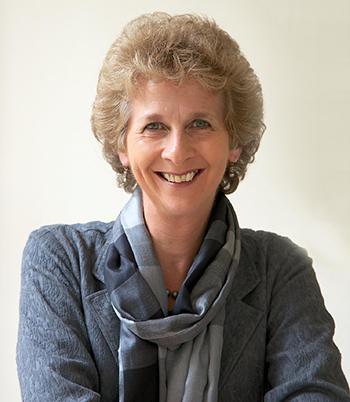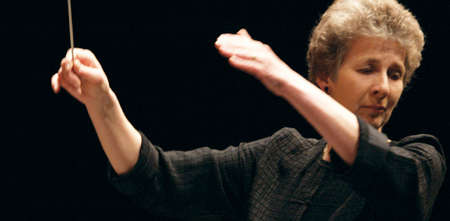by Daniel Hathaway

Since we last spoke, Jane Glover has become Dame Jane, having been named Dame of the British Empire in the Queen’s New Year Honours in January. I reached the conductor by phone at her home in London in mid-June, and wanting to observe proper protocol, started out by asking her how she should be addressed these days.
Dame Jane Glover: Jane is absolutely fine, but Dame Jane is very nice, thank you.
Daniel Hathaway: I see that you’re also referred to as ‘Professor Dame Jane’ on your website.
DJG: I know. It’s a bit cumbersome, isn’t it. It maybe takes its cues from the realm of Gilbert and Sullivan, which one cannot help thinking about.
DH: Tell me more about your honour.
DJG: It absolutely cheered me up in the middle of a truly terrible year. I got an email saying, your name is being put forward for this. Would you accept it if it were offered? And so you say yes. Some people do turn them down. I replied immediately. ‘I jolly well would, absolutely.’
DH: Is there a big ceremony involved?
DJG: Normally there are a number of investitures through the year at which honours at all levels are handed out. They all used to be done exclusively by the Queen, but now other members of the Royal Family are taking a lot of them. Charles did my last one when I got the CBE [Commander of the Order of the British Empire]. They hadn’t named any for the past year, but I just got a letter yesterday saying they’re going to start again quite soon. So with any luck I’ll be going to the Palace again.
DH: Will you be touched on the shoulder with a sword?
DJG: The knights get that, but I don’t think they do anything so unladylike for the dames. I just get a nice medal pinned to me. It’s very arcane but it’s lovely. And in all seriousness, I do feel very honored. But of course, a conductor is nothing without musicians to conduct, so in a sense, my honor belongs to all the people I’ve worked with.
DH: What was your last live event before the shutdown?
DJG: It was in Chicago on February 28 last year. I’d done a series of concerts with my lot, Music of the Baroque, then I came back at the beginning of March and had to decide whether or not to go to Italy to give some lectures. Italy at the time was at the heart of the first wave, and the country was clearly in a mess. I thought I’d better not go and pulled out. But I’d already booked a flight to Montreal when Mr. Trudeau closed Canada. That was the beginning of the great shutdown. Curiously, that trip should have taken in Montreal, Houston, and Helsinki.
All of that went, then everything went, and the horizon just continued to recede. It was an extraordinary time for the whole planet. I finally got back to work the end of March this year, thirteen months out, and then I was very lucky to be able to go to America to do concerts with my orchestra in Chicago and with the Houston Symphony. And I did a whole opera — Britten’s Albert Herring — in Minnesota. I’m so proud of Minnesota Opera because not many opera companies did anything at all, let alone a full opera.
Of course, there were rigid COVID rules, but all were absolutely adhered to with great imagination. I have to say the production was a triumph. And the main thing is, everywhere I’ve been — and I’ve just been in Chicago again — we’re all gathering to rehearse and make music with such joy and gratitude. It’s just wonderful to get back into a rehearsal room.
DH: Did you find a creative use for your pandemic downtime?
DJG: Against all my better instincts, I started another book. I wrote a book about Handel four years ago that nearly killed me. I said, OK, that’s it. I’m never going to write another one. But when the pandemic shut us all down, I thought, if I don’t engage my mind, I’m going to lose it. So there’s a little bit of unfinished Mozart business, and that’s what I’m doing now. Right now. It’s in front of me on the desk.
It’s about something I rather skated over in my previous book about Mozart. It’s partly about him and partly about his years in Italy between the ages of 13 and 16, which are formative ones for any young chap growing up, let alone a genius who encounters all that Italy has to offer. What happened to him then was remarkable. It’s also partly my love letter to Italy which is a very wonderful country in my life too. I’ve been commissioned now, so I’ve got to do it. I’m about a quarter of the way through.
DH: When was your upcoming date at Blossom confirmed?
DJG: To be honest, we’re still hoping like anything that I’m going to make it. It’s very difficult to get into your country, unless your wonderful new president just releases all the restrictions on people coming in. I’ve been in twice now, and one has to jump through any number of extraordinary hoops — and the hoops keep moving, that’s another thing. It’s very tense and very last-minute.
Our wonderful soloist Benjamin Grosvenor and I are in the same boat. I’ve got a three-year visa, so that’s no problem, it’s the National Interest Exception. It all seems a bit of a lottery. But I really hope I’m coming, because I’m told wonderful things about Blossom, that it’s the most gorgeous place. And I have to say that The Cleveland Orchestra is my favorite orchestra on the planet.
DH: How do you feel about performing Mozart al fresco?
DJG: The audience is al fresco, but the musicians are not, and I hear that the acoustic is gorgeous. And there’s a very sophisticated sound system, too. I think Mozart would be thrilled to hear that his music was being played in this beautiful place by some of the best musicians in the world.
DH: Have you worked with Benjamin Grosvenor before?
DJG: I have not. We nearly did once. We know each other, because when I was director of opera at the Royal Academy of Music, he was still a student there. A student with a massive career, because he’d been performing at such a high level since he was about 15. I think he still goes in for piano lessons. He’s a very humble guy. He’s got the lot — the power and the delicacy, massive imagination, and a beautiful sound. I think he’ll be wonderful in the Mozart d-minor. In all the Mozart concertos, there’s an important dialogue between the soloist and the orchestra, and he’s such a great chamber musician. We were booked for the Schumann with one of the orchestras here, but one of us didn’t make it, and I think it might have been me.
DH: I see you’re going to conduct in Gran Canaria the week after next.
DJG: But I still have to get a visa, and that’s nothing to do with COVID, that’s to do with blasted Brexit.
DH: I was just going to ask how you felt about Brexit.
DJG: Oh, don’t ask! For musicians, it’s as disastrous as COVID. Just getting into another European country like Spain or Germany or France to work is as complicated as getting anywhere.
DH: And you’re scheduled to perform at Aspen in August with James Ehnes.
DJG: I’m really excited about that. I’ve never worked with him, but I’m a huge admirer.
DH: On the whole, were there any upsides to the pandemic year?
DJG: I have to say there were some benefits. I’ve never spent a whole year at home, and actually it’s been rather nice. Of course there was a constant underlay of anxiety and fear, and all that was so disconcerting, but the whole business of waking up in your own home every day was lovely. I do know that I’m one of the lucky ones. I just feel so much for people at the beginning of their careers rather than people like me who’ve been at it for decades. It’s really tough for them.
[As if on cue, at this point, Glover’s landline rang.]
DJG: You know what this is — this is Track-and-Trace, checking up on me. [Takes the call.] I can confirm that I’m in quarantine, I am obeying the rules, and I’ve taken the tests at the right time. [Rings off] Such a waste of time. They call you every day because we’re technically in quarantine, and if they don’t find you they send someone to see if you’re there. If you’re not, there’s quite a hefty fine, so you have to take this quarantine thing seriously. Surely things will be back to normal when I come to Cleveland again in March.
[UPDATE: Benjamin Grosvenor will be replaced by Conrad Tao, who will play Piano Concerto No. 23 in A, K. 488.]
Published on ClevelandClassical.com July 7, 2021.
Click here for a printable copy of this article




